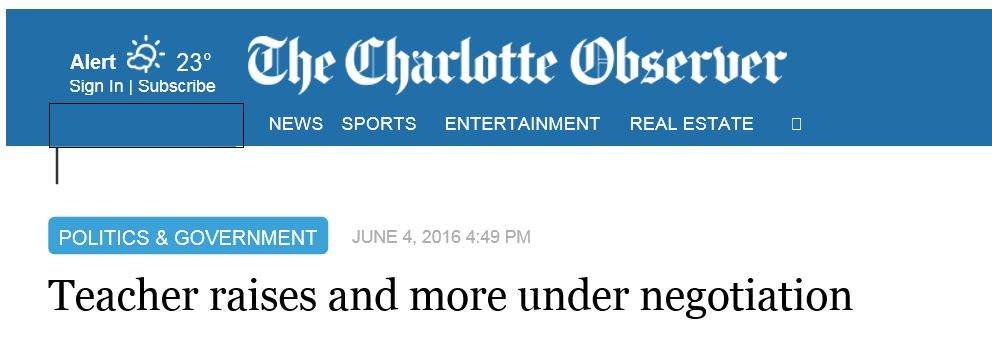BY LYNN BONNER
As state House and Senate negotiators prepare to work out a final budget, a lot of attention will be focused on the size of pay raises for teachers. Teacher raises turned into a major sticking point two years ago when the Senate voted for bigger raises than the House.
This year, the House proposes average teacher raises of 4.1 percent. The Senate plan would raise teacher salaries an average of 6.5 percent.
There’s more going on under the hood beyond the raw numbers.
The Senate plan also departs from a change made two years ago when the legislature compressed the teacher salary schedule – creating broad tiers. Under the current system, teachers with 14 years experience make as much as teachers with nine, and teachers with 19 years experience make as much as those with
Senate plan goes back to giving teachers more for each year they work, from the third year to the 15th year. At 15 years experience, the Senate pay schedule returns to salary tiers.
Gov. Pat McCrory’s proposed salary schedule also would revert to yearly raises for most teachers. His education adviser told the State Board of Education that teachers didn’t like the new tier structure.
Although House and Senate plans are different, they both give bigger percentage raises to mid- career teachers.
The pay plans shortchange teachers with the most experience, said Mark Jewell, vice president of the N.C. Association of Educators.
“Clearly, we are pleased the General Assembly has heard us beat the drum of the teacher shortage crisis and teacher compensation,” Jewell said.
“When you look at this, it still falls short for those with the most experience,” he said.
Teacher pay reliably appears as a campaign issue every two years. Even with an increase, teachers have plenty of issues to worry about, Jewell said. Schools don’t have enough textbooks, making it hard for parents to help with homework, he said. Teachers who don’t already have advanced degrees won’t get pay bumps for earning them, as they used to, and legislators want to expand the school voucher program.
“They see what’s going on, and they don’t like it,” Jewell said. “I don’t think they’re going to be fooled with an election-year ploy like this.”
General Roy Cooper in the governor’s race and Democrats in four Council of State races.
But Dallas Woodhouse, executive director of the state Republican Party, said pay raises will help GOP candidates going into election season. He described the increases as a result of Republican policies.
“The policy of properly compensating teachers is now possible because of the strong economic policies that have turned North Carolina’s economic fortunes around by getting people off unemployment and getting people back to work,” Woodhouse said in a statement. “Teachers and state employees will not only benefit from higher pay but from the broad based middle class tax relief that has made North Carolina’s economic recovery an envy of thesouth.”
Plenty of education issues are in the mix for budget negotiations.
The House and Senate take different approaches to promoting early childhood literacy, increasing the supply of teachers, and principal training.
On literacy
The House halts a plan to hire more teachers to reduce first-grade class sizes, which would have cost about $27 million. Instead, the House spends $25 million on literacy coaches for elementary schools in the bottom fifth in performance. The House budget also cuts $10 million from summer reading camps for first- and second-graders who aren’t reading at grade level.
The Senate keeps the $27 million for the additional first-grade teachers and adds another $27 million to hire more second-grade teachers to reduce class sizes by one student.
The budget has $10 million to pay for a pilot program giving bonuses to top third-grade reading teachers.
The legislature has focused on elementary school reading for the past four years. A law called Read to Achieve requires most students read proficiently by the end of third grade or risk retention.
These different approaches offer an opportunity for legislators to talk about “which elements are going to affect third-grade literacy the most,” said Brenda Berg, president and CEO of BEST NC, a business group focused on education.
Teacher pipeline
Enrollment at UNC schools of education has dropped 30 percent in the last five years. Local districts say their problems with teacher recruitment extend from high school math and science down to elementary schools.
The House budget includes a $2 million merit scholarship program for college students studying to become teachers in subjects such as math or science, or who plan to work in hard- to-staff schools.
The Senate budget has $112,500 to reimburse 25 teacher assistants in five counties studying to become teachers. They would receive up to
$4,500 a year. The budget also includes a plan for five lateral entry teacher preparation programs local school boards would administer.
Principal preparation
The House budget provides an additional $7.5 million to the program for school-leadership development, bringing the total to $8.5 million.
The Senate eliminates that program, but would establish lab schools at UNC-system schools that have teacher training programs. The intent is to improve student achievement in districts with low-performing schools, and to provide teacher and principal training in those districts. The budget has $1 million in startup funds.
STAFF WRITER COLIN CAMPBELL CONTRIBUTED
Lynn Bonner: 919-829-4821, @Lynn_Bonner
Click here to view Teacher raises and more under negotiation PDF
[/vc_hidrop]



